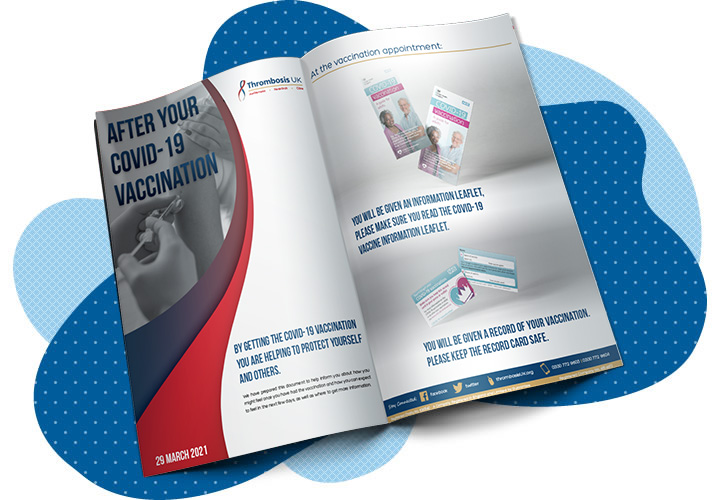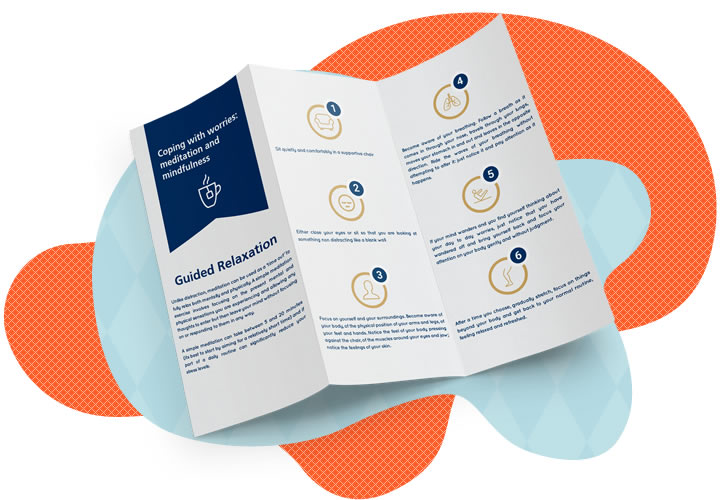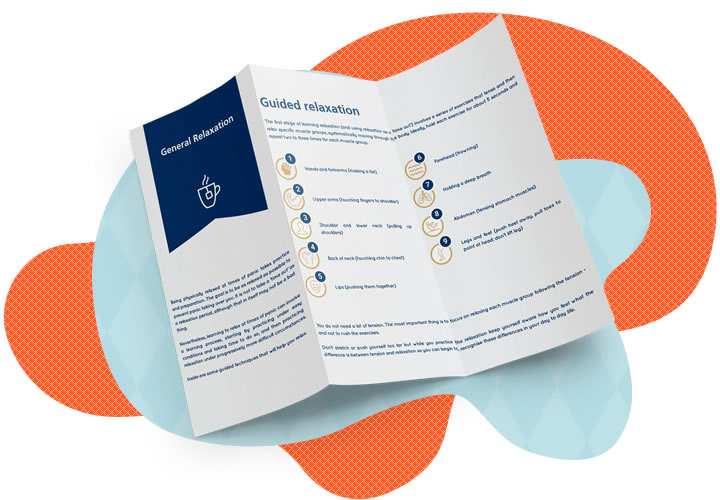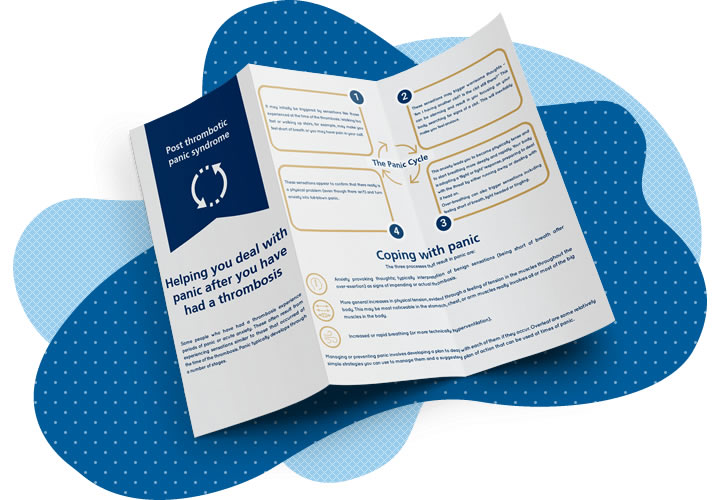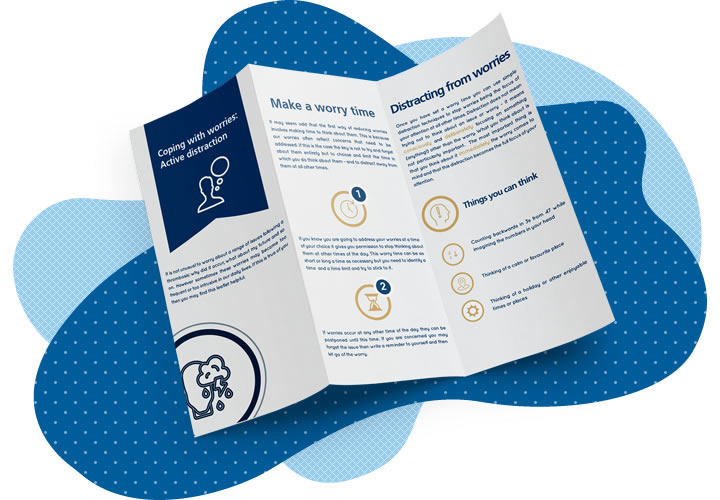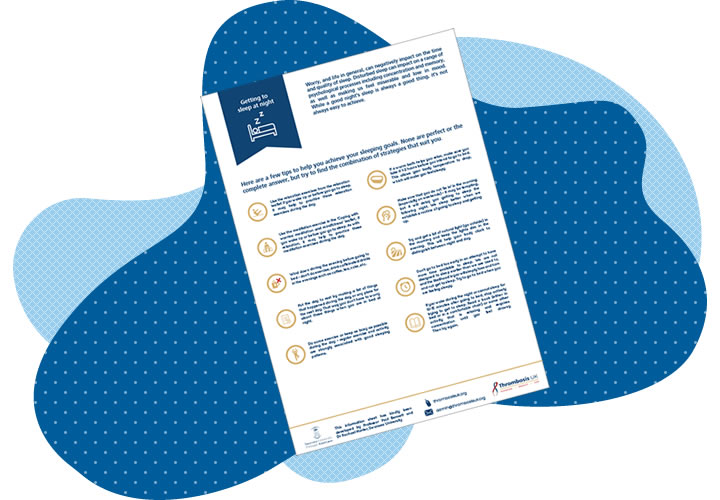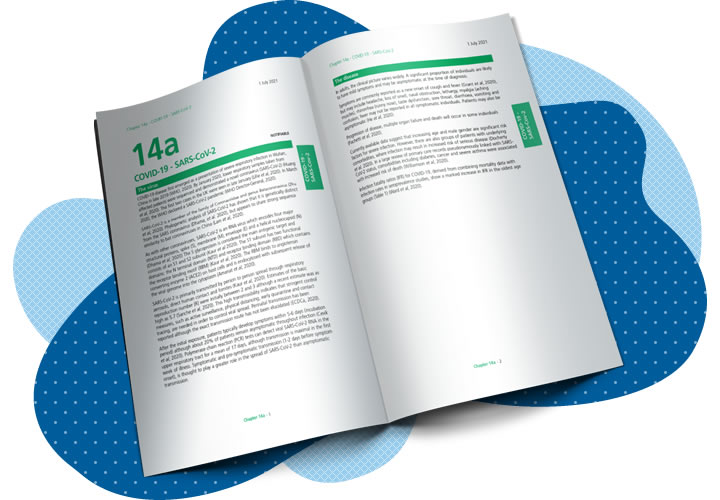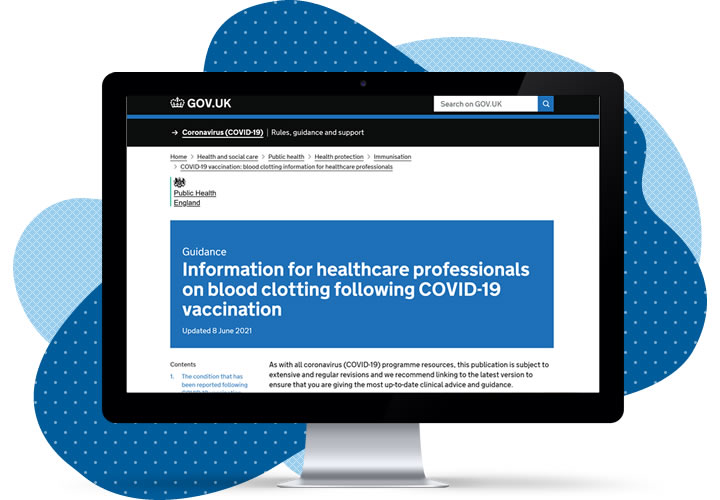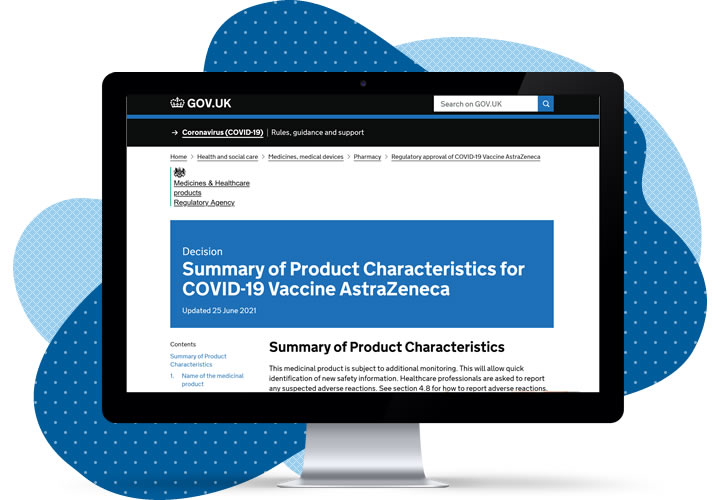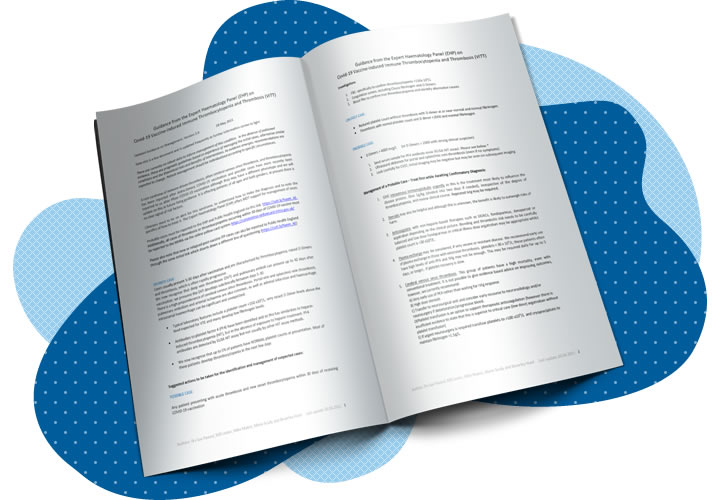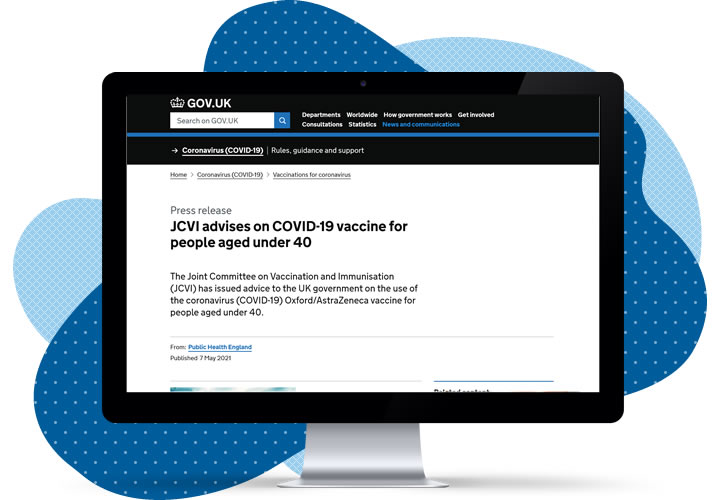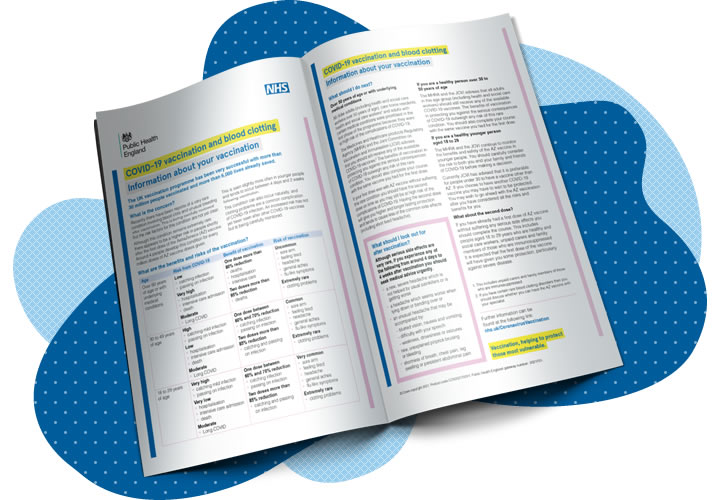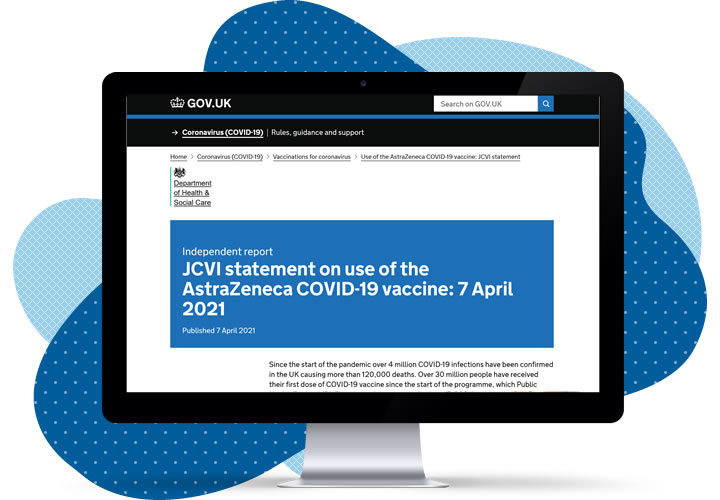In March 2021 the first reports of an extremely rare adverse event of concurrent thrombosis (blood clots) and thrombocytopenia (low platelet count) following the Oxford Astra-Zeneca COVID vaccination were reported. This new syndrome was named Vaccine-induced Immune Thrombosis and Thrombocytopenia (VITT).
Study exploring the psychological consequences of VITT
Hello. Are you interested in taking part in a study exploring the psychological consequences of being diagnosed with VITT, led by Prof Paul Bennett of Thrombosis UK and Swansea University? The study will involve taking part in an interview via zoom which will address your experience of VITT and its impact on you and people close to you. It is anticipated that the interviews will last a maximum of one hour.
If you would like more details about the study, please email Paul Bennett at [email protected] to register your interest. He will send you details of the study and the opportunity to discuss your participation.
Thank you for considering participation in the study

Vaccine-induced Immune Thrombosis and Thrombocytopenia is a very rare immune condition. Patients with VITT have a unique antibodies to platelet factor 4 (PF4). The antibodies cause activation of the platelets and the blood clotting system, leading to clots (thrombosis) forming in the blood vessels, and a low platelet count as the platelets are used up in the process.
VITT causes blood clots to form in the blood vessels in different parts of the body including the brain, liver, gut, heart, legs, lungs and kidneys and is considered a medical emergency that can be fatal, even if treated appropriately. If suspected, VITT needs urgent medical attention.
Associated with the COVID-19 vaccines, in particular Oxford Astra-Zeneca and Johnson and Johnson, VITT is extremely rare. Currently there are no clear risk factors to identify those who may be at increased risk, it affects women and men to a similar extent and can affect people of all ages however many of cases reported have been in people under 50 years of age.
Symptoms start five or more days after a COVID-19 vaccine and often occur at unusual sites in the body.
- Headaches are common and are unusually severe and persistent, and may be worse on lying down or bending forward.
- The headache may occur with changes in vision, feeling or being sick.
- Fits (seizures) can occur, or weakness on one side of the body or a drop in consciousness.
Other symptoms can include:
- Persistent abdominal (tummy) pain
- Blood in the stools
- Chest pain, shortness of breath
- Leg swelling
From February 2022 Thrombosis UK has made available two new services that may be of benefit to VITT survivors:
- A closed Facebook peer to peer support group specifically for VITT patients
- An internet-based psychological support service led by a clinical psychologist to which patients may be referred by clinicians or self-refer.
These provisions add to our existing support including patient-and professional-focused information on VITT and a range of psychological coping strategies presently available on the Thrombosis UK website

Thrombosis UK currently has run a highly successful Facebook peer to peer support group for patients with VTE for several years. A second, fully moderated, closed support group, restricted to patients with a confirmed diagnosis of VITT is now available. To learn more and join this closed group designed to provide support, please email [email protected]

Psychological support
Thrombosis UK has established a psychology therapy and consultancy service specifically for VITT patients.
This is led by a clinical psychologist (Prof Paul Bennett) who has substantial experience in the treatment of individuals experiencing adverse psychological reactions to significant health challenges. Although operating virtually (via zoom), this will provide live therapy sessions, email support, and consultations as appropriate.
All patients referred to the service will have an initial ‘live’ consultation and follow-up support as appropriate.
If you have been diagnosed with Vaccine-Induced Immune Thrombocytopenia and Thrombosis (VITT) and would like to learn more about the support available from Thrombosis UK for VITT survivors, please complete this online form.
As COVID vaccinations continued to be monitored, via the 'yellow card' system.
The Medicines and Healthcare and products Regulatory Agency (MHRA) and the Joint Committee on Vaccination and Immunisation (JCVI) continually review evidence and updated guidance accordingly.
In March 2021 the Expert Haematology Panel (EHP) was set up. This team of experts have daily meetings to review suspected cases of VITT and have developed Living Guidance for clinicians in the prevention and management of VITT and a Patient Information fact sheet on VITT, endorsed by Thrombosis UK.
Thrombosis UK has and continues to liaise with all professional bodies to ensure up to date and accurate information is shared and the experiences of those diagnosed with VITT or concerned about the risk of VITT are shared with the committees.
13 May 2022
Clots and COVID-19 vaccines
Prof Beverley Hunt OBE, Dr Sue Pavord & Prof Paul Bennett
Watch Now
10 January 2022
Letter in New England Journal of Medicine (NEJM) explains why it is safe for individuals who have had VITT to receive a second Covid-19 vaccine. Data gathered is largely with use of the Pfizer vaccine, although some patients received a second Astra Zeneca vaccine.
Read Letter
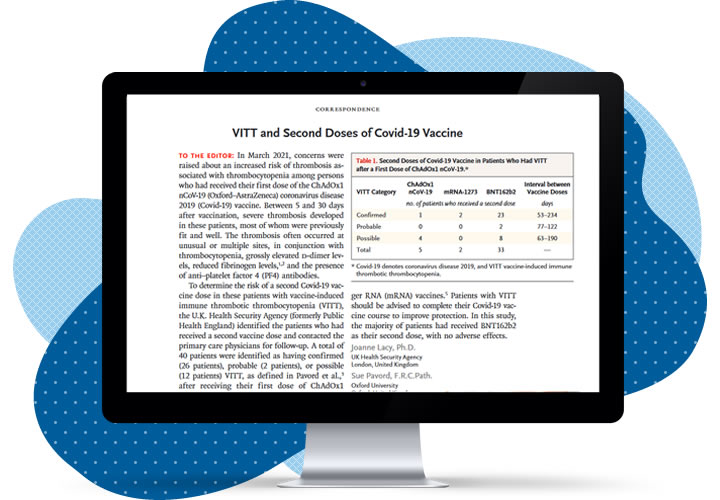
Prof Beverley Hunt OBE, Prof Michael Makris, Prof Marie Scully, Dr Sue Pavord & Prof Paul Bennett
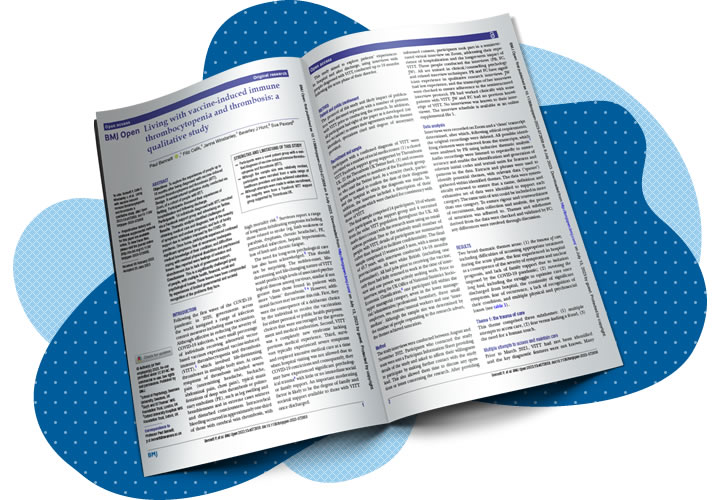
Living with vaccine-induced immune thrombocytopenia and thrombosis: a qualitative study
Objectives: To explore the experiences of people up to 18 months after being diagnosed with vaccine-induced immune thrombocytopenia and thrombosis (VITT).
Read Article
THE RISK OF THROMBOSIS IN LONG COVID
In this tutorial, Beverley outlines the risk of thrombosis in Long COVID, including what we know so far about thrombosis risk, seated immobility syndrome which does increase risk of blood clots, and what, if anything, does a D-dimer test tell us about someone’s risk of blood clots.
BLOOD CLOTS IN ACUTE COVID-19 INFECTION
In this tutorial, Beverley discussed blood clots in acute COVID-19 infection, including who is at risk, the types of thrombosis seen, and what preventative measures are recommended for moderately and severely unwell patients.
VACCINES AND BLOOD CLOTS
In this tutorial, Beverley introduces vaccine-induced immune thrombocytopenia and thrombosis syndrome, an extremely rare immune response to a vaccine causing thrombosis (blood clots) and thrombocytopenia (low platelet count), most commonly following the Astra-Zeneca vaccine.
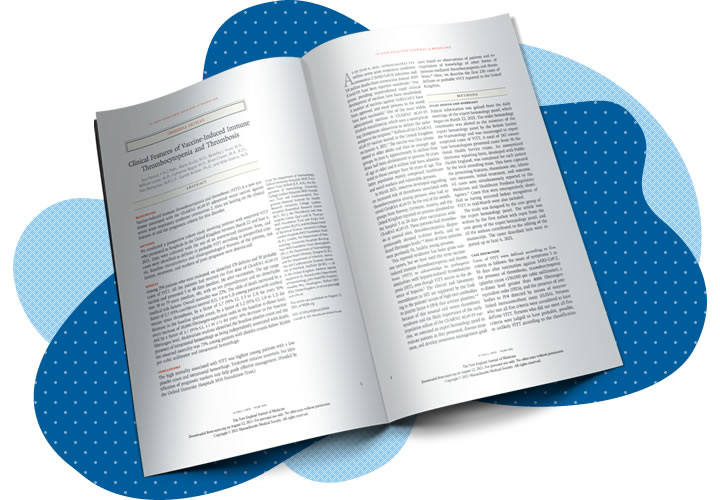
UK experience of Vaccine-Induced Immune Thrombocytopenia & Thrombosis (VITT) of first 220 cases
Published August 11th 2021
Vaccine-induced immune thrombocytopenia and thrombosis (VITT) is a new syndrome associated with the ChAdOx1 nCoV-19 adenoviral vector vaccine against severe acute respiratory syndrome coronavirus 2. Data are lacking on the clinical features of and the prognostic criteria for this disorder.
Read Article
NG200 COVID-19 rapid guidelines: vaccine-induced immune thrombocytopenia and thrombosis (VITT)
This is a living guideline which means that it will be updated in real-time to take account of changes in clinical practice and emerging evidence.
NICE methods and processes for a living guideline include:
- Weekly evidence search and consideration of studies for impact on recommendations
- Weekly search for related guidelines or policy information in the area (e.g. PHE or MHRA) to check for conflicting advice
- Tracking of ongoing research
- Considering changes in the practice flagged by clinicians and patient reps in the field through our enquiry system
Read Guidance
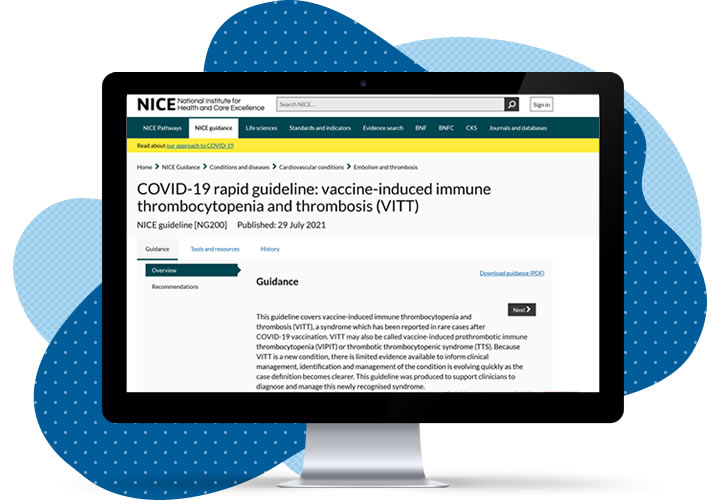
Thrombosis UK is not aware of any current and specific psychological support service for patients and families affected Vaccine-induced Immune Thrombosis and Thrombocytopenia (VITT), although we have approached NHS bodies to seek an update on proposed services.
If you have been affected by VITT and would like to talk with someone, we do have a Helpline open most weekdays. The Helpline can offer information and supportive psychotherapy, but please be aware this is manned by Thrombosis UK staff with a wealth of experience in thrombosis but who are not trained to provide psychological /professional counselling services. However, sometimes a supportive conversation trying to make sense of the events and information about VITT and thrombosis can be a huge help, so please do consider this if you feel it may be of help.
Thrombosis UK has a range of support resources that are medically and peer reviewed.
Our resources are free of charge and can be downloaded. These include:
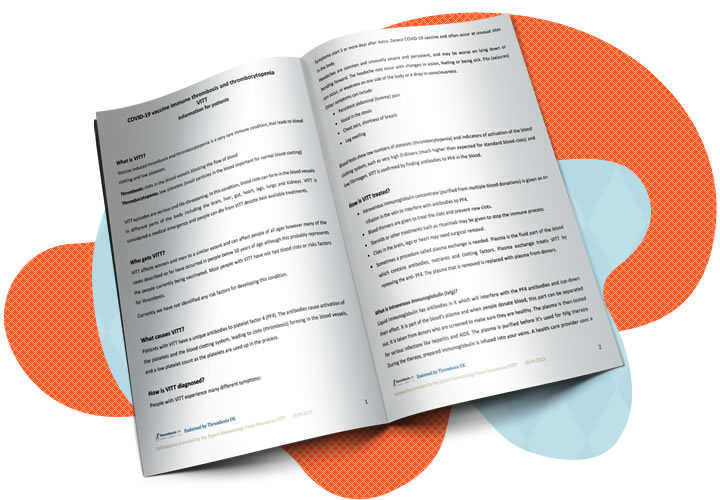
VITT Patient Information Sheet: Developed by the Expert Haematology Panel and endorsed by Thrombosis UK
18 April 2021
Recordings of recent patient information and support meetings including ones on VITT and coping with the psychological impact of thrombosis, are available here.
If professional support is needed, Thrombosis UK always advises individuals to talk with their GP or medical team, and explain the sudden and acute experience you have experienced and how this has left you feeling and to ask for a referral to professional support.
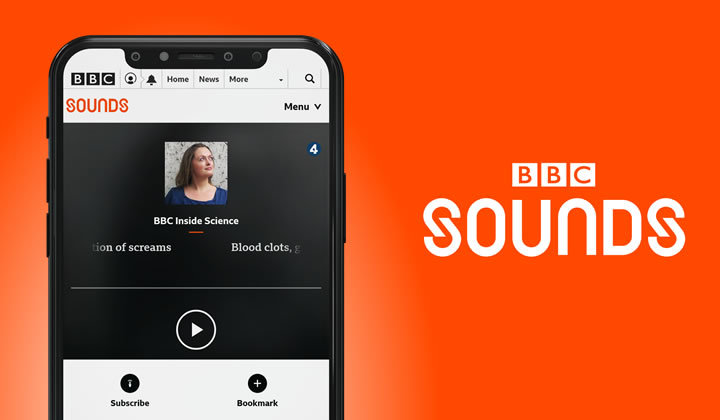
15 April 2021
Pod cast on BBC Sounds with professor Beverly Hunt OBE - ‘What we understand about COVID-19 vaccines’
Listen Now
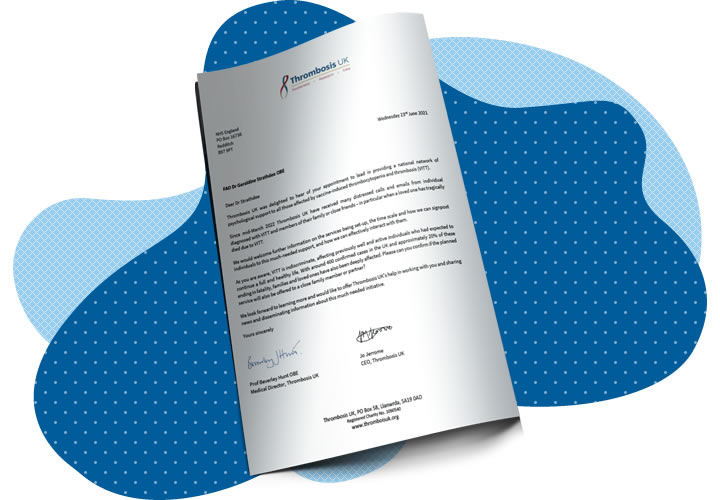
30 June 2021
Thrombosis UK has sent a letter to Dr June Raine CBE, CEO of MHRA, expressing our concern regarding wording in the MHRA guidance on the use of the AstraZeneca COVID-19 vaccine.
Read the Letter
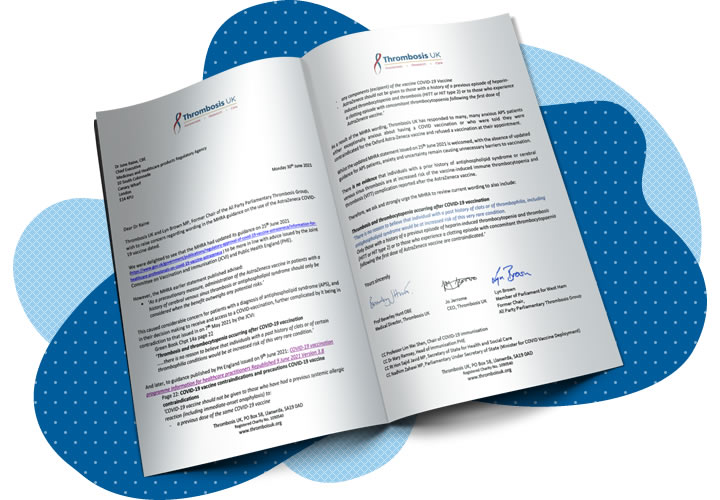
7 April 2021
Letter from the Expert Haematology Panel and endorsed by Thrombosis UK, to the Medicines and Healthcare products Regulatory Agency (MHRA).
We wish to raise our concern with the MHRA regarding wording included in recent changes in MHRA guidance on the use of the AstraZeneca COVID-19 vaccine.



